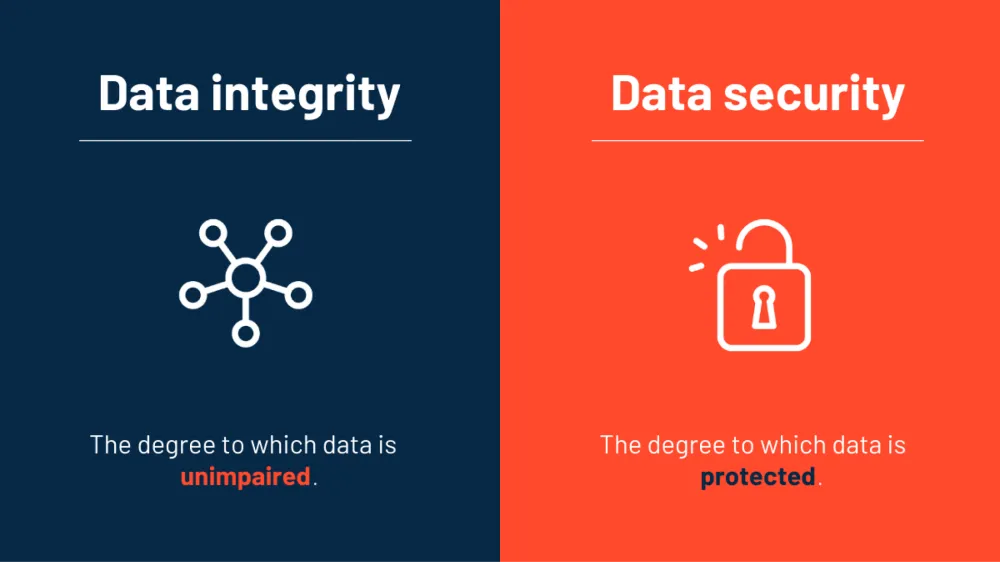The healthcare sector is seeing a widespread digital transformation, with electronic health records (EHRs), telemedicine, and artificial intelligence (AI) reshaping patient data management. While these advancements promise enhanced care and efficiency, they also present new hurdles, particularly concerning the emerging importance of health technology data.
Data integrity in healthcare is crucial, forming the basis for reliable patient care. This in-depth blog will discuss the difficulties surrounding data integrity in healthcare, focusing on 5 key strategies necessary to facilitate data integrity in today’s digital era.
What is Data Integrity in Healthcare?
In healthcare, data integrity refers to the precision, completeness, and coherence of patient information throughout its lifecycle. The data includes patient details like name, demographics, medical history, test results, and treatment plans.

Upholding data integrity is vital since slight inaccuracies can result in costly errors such as misdiagnoses, improper treatment choices, and grievous patient harm. Healthcare institutions are accountable for ensuring the reliability and credibility of their data by enforcing robust security measures, adhering to data governance protocols, and performing frequent quality assessments. Prioritizing data integrity protects patient well-being and cultivates trust in the healthcare sector.
What is The Difference Between Data Integrity And Security?
Data integrity and security play vital roles in healthcare by focusing on distinct aspects of patient information. However, there are still some differences between the two.
Data security involves protecting patient data from unauthorized access, breaches, or loss through encryption techniques, access controls, and firewalls. Think of it as a fortress around the data, preventing cyberattacks or internal misuse.
Read more: Data Loss Prevention in Healthcare: The Ultimate Security Guide
Data integrity emphasizes the accuracy, completeness, and consistency of the information within that fortress. Data integrity ensures data quality, preventing errors, duplicates, or inconsistencies that could result in misdiagnosis or treatment mistakes.

Data security protects data, while data integrity ensures its reliability. Despite their different functions, both are crucial for establishing a resilient healthcare system that emphasizes patient safety and provides dependable care.
Why Maintaining Data Integrity in Healthcare is Important
Evidence shows that data integrity can directly influence patients’ conditions during care delivery. Nevertheless, in broader terms, data integrity in healthcare is also essential as it holds significant impacts on various aspects of the industry as a whole, to name a few:
- Patient safety
- Continuity of care
- Research and public health
- Regulations compliance
- Documentation and patient matching
1. Patient Safety
Accurate diagnoses and treatment form the foundation of effective healthcare delivery. Imagine a patient with an unusual medical history who needs more accurate data – anything from missing allergies, outdated medications, or a typographical error in their blood type. Such discrepancies can create a chain reaction where doctors might misinterpret the information, leading to incorrect diagnoses. Consequently, this could result in staff administering an inappropriate treatment plan, potentially triggering adverse reactions or delaying the necessary action.
Therefore, upholding data integrity is the key to ensuring that patient information remains precise and current. This empowers healthcare providers to make well-informed, data-driven decisions that ultimately protect patient well-being.
2. Continuity Of Care
Coordinated care depends on precise and consistent patient data. When patients engage with various healthcare providers and specialists, having a unified perspective of their medical background becomes imperative.
For instance, in the case of a patient with a complex medical condition, it is vital that a cardiologist knows their allergies, a dermatologist is informed about their medications, and the primary care physician is aware of all these details along with the ongoing treatment strategies.
In this context, accurate and consistent patient data is a central point of truth, guaranteeing that all involved parties possess a comprehensive understanding. This fosters smooth communication, mitigates potential medication conflicts due to incomplete information, and enables healthcare professionals to collaborate efficiently, resulting in a more holistic and well-coordinated care plan for the patient.
3. Research and Public Health
Ensuring data integrity in healthcare is paramount to patient safety. Data drives innovative research and safeguards public health. Quality healthcare data is fundamental for medical research. Ensuring accurate and complete data leads to trustworthy findings that can transform treatments and disease prevention.
Additionally, maintaining data integrity strengthens disease surveillance, enabling healthcare professionals to monitor outbreaks, detect emerging trends, and implement focused public health measures, thus protecting entire communities’ well-being.
4. Regulatory Compliance
One of the most important factors in data integrity in healthcare is regulatory compliance. Healthcare entities must adhere to stringent regulations and remain HIPAA Compliant, following set guidelines for protecting and maintaining patient data.
Enhancing data integrity means being in complete alignment with these regulations. Accurate, complete, and consistent patient information and remaining in compliance will protect healthcare organizations from legal consequences and fines related to non-compliance. This regulatory requirement underscores the significance of data integrity, transforming it from a best practice into a legal mandate for healthcare providers.
5. Patient Matching Concerns
Accurate patient matching is essential to address the challenges posed by healthcare institutions’ high volume of duplicate records. Duplicates may arise from minor issues such as inconsistent name spellings, non-standardized data entry practices, or simple typos. The complexity intensifies as patient data traverses various healthcare organizations with diverse data sources, incompatible formatting standards, and differing governance processes, complicating the identification and merging of duplicate records.
These obstacles underscore the urgent requirement for robust data integrity strategies in healthcare. Ensuring precise, comprehensive, and reliable patient records is paramount for protecting patient safety, preventing treatment errors, and ultimately fostering trust in the healthcare system.
Causes of Data Integrity Loss in Healthcare
The critical role of data integrity plays in ensuring patient safety and delivering high-quality care cannot be denied. Unfortunately, several factors can compromise this integrity, leading to inaccurate or incomplete patient information. To mitigate these issues, it is recommended that you address the most common causes of data integrity loss in healthcare, including:
- Human error
- System glitches
- Inadequate security
- Data migration
- Lack of validation

1. Human Error
Human errors pose a significant challenge in maintaining data integrity, especially with manual data entry and processing, which are prone to mistakes. The procedure can result in inaccuracies or inconsistencies in patient records.
Typical incidents include healthcare workers mistyping a patient’s date of birth or lab technicians misinterpreting test results. Despite seeming minor, these errors can lead to severe mistakes like misdiagnosis, incorrect treatment plans, and compromised patient care. Addressing these risks involves standardizing data entry processes, using data validation tools, and fostering a culture of data accuracy among healthcare professionals.
2. System Glitches
System glitches in healthcare can have disastrous effects on data integrity. For instance, a doctor may encounter a database crash while updating a patient’s medication list, resulting in lost updates and incomplete records.
Additionally, bugs during data transfers between systems can corrupt or misplace information, leading to inconsistencies or missing data entries. These issues can even trigger the creation of duplicate records if the system fails to acknowledge a successful transfer and tries to re-upload the data. In the most severe cases, system outages can make entire datasets inaccessible, disrupting patient care and endangering the continuity of treatment plans.
3. Inadequate Security
Cybersecurity threats have the potential to compromise data integrity, even when they may appear unrelated.
Malware, for example, can stealthily breach healthcare systems, leading to the corruption of patient files, changes in database records, or the insertion of false information. Such intrusions can remain undetected for extended periods, possibly resulting in misdiagnoses or inaccurate treatment plans. Additionally, phishing attacks, which deceive users into disclosing login credentials, can provide unauthorized entry to hackers. Consequently, these hackers could manipulate sensitive patient records, erase vital data, or demand ransom for its release.
These instances underscore the significant risk that cybersecurity threats pose to the accuracy, completeness, and reliability of healthcare data, ultimately impacting both patient safety and healthcare operations.
Read more: How to Ensure Data Security in Healthcare Software Outsourcing
4. Data Migration
Data integrity is usually at risk when a large amount of patient information gets transferred across healthcare systems. Minor glitches in data transfer can result in errors and inconsistencies. For instance, the Extract, Transform, Load (ETL) process, a standard data migration method, can lead to lost or corrupted records due to issues in extraction, transformation (data formatting for the new system), or loading. Similarly, transitioning to a new database management system may cause compatibility problems, leading to misinterpretation or incorrect mapping of data fields. These transfer mishaps can undermine data integrity by generating duplicates, missing data, or inaccurate entries.
5. Lack of Validation
Data validation serves as the crucial gatekeeper for maintaining data integrity in healthcare. When data goes unchecked, errors like typos, inconsistencies, and duplicate records can easily infiltrate the system during input processes. Also, incomplete data may pass unnoticed, resulting in an erroneous patient health status overview.
This lack of data integrity can have significant repercussions, ranging from misdiagnoses to inefficient resource allocation, ultimately culminating in a decline in the quality of patient care.
5 Strategies to Ensure Data Integrity in Healthcare
As mentioned above, various challenges can threaten data integrity. To defend against these issues, let’s explore the five main strategies that healthcare organizations can put in place to ensure trustworthiness while handling both internal and external data resources, namely:
- Enforce data governance policies
- Provide data context
- Ensure legal compliance
- Maintain real-time records
- Perform regular accuracy checks

1. Enforce Data Governance Policies
Data governance plans form the basis for upholding the security and integrity of an organization’s data. These plans outline protocols for documenting, handling, and sharing data, setting forth uniform policies for all staff members to adhere to. This ensures the protection of the organization and its sensitive data.
Specifically, EHR systems can manage data governance in hospitals and life sciences entities, serving as a centralized hub for inputting, storing, and exchanging vital healthcare data. This simplifies data management and aids in compliance with established governance guidelines.
Patient portals are increasingly used in the life sciences and emerging biotech fields. These portals serve as crucial tools for data governance in a patient-centric setting as organizations interact more directly with patients. They bolster a more comprehensive and transparent data governance framework by offering a secure platform for patients to access and control their health information.
2. Provide Data Context
Maintaining data integrity in healthcare extends beyond ensuring accuracy to include critical contextual details. Specific details should accompany every data point within a patient record:
- Identity of the recorder: Knowing who entered the data (doctor, nurse, etc.) establishes accountability and allows for verification if needed.
- Location of the observation: Specifying where the data was collected (hospital room, lab, etc.) provides valuable context for interpreting the information.
- Timestamp: Recording the exact date and time of data entry ensures a clear chronological record and helps track changes over time.
- Patient linkage: Clearly associating the data with a specific patient is paramount to avoid confusion and ensure it reflects the correct individual.
These details act as a digital fingerprint, accurately anchoring data to patients, research, or production batches. Besides, they also allow for a traceable audit trail for healthcare professionals, ensuring trust, enhancing patient care, and boosting research precision.
3. Ensure Legal Compliance
Public trust in healthcare data security is disconcertingly low, with over 61% of Americans voicing concerns. In 2022, a shocking 40 million patient records were threatened, underscoring the susceptibility of healthcare data to breaches.
Breaking down this challenge necessitates healthcare employees exercising exceptional caution. Strict adherence to HIPAA regulations is crucial not only for patient welfare but also for research and pharmaceutical marketing purposes. This entails securely storing patient information and restricting access solely to authorized personnel while implementing stringent access controls and encryption measures. Healthcare institutions can restore trust and shield sensitive patient data by emphasizing data security across all information processes.
4. Maintain Real-Time Records
Up-to-date information serves as the cornerstone for maintaining accurate healthcare records. Imagine a scenario where a researcher depends on handwritten notes to capture a patient’s progress – these notes could be incomplete, easily lost, or misinterpreted by others referencing the same record. Such outdated methods can impede collaboration and slow progress.
Fortunately, modern technology provides a remedy. Personal health devices seamlessly transmit patient data directly into electronic records, ensuring real-time updates. This not only guarantees data accuracy and accessibility for healthcare professionals but also equips researchers with a more holistic view of patient behavior. Essentially, real-world data empowers researchers to tailor treatment options and gain profound insights into patient needs, driving advancements in healthcare delivery and research.
5. Perform Regular Accuracy Checks
Careful data entry is crucial, but ensuring data accuracy in biotech and life sciences research means double-checking input. Confirming data entry and checking for typos, inconsistencies, and protocol adherence minimizes initial errors.
Additionally, precise data loses value without a clear presentation. Things like standardized terminology, consistent units, and detailed annotations are crucial. Clear records aid reviewers, collaborators, regulatory bodies, and future researchers in comprehending and reproducing data accurately. This comprehensive approach upholds data integrity in healthcare, building trust in research outcomes and supporting scientific progress.
KMS Healthcare – Ensuring Top-Notch Data Integrity for Every Healthtech Project
Ensuring data integrity in healthcare is an ongoing commitment rather than a one-time fix. By adopting the best practices discussed in this blog, ranging from robust data governance to regular check-ups, healthcare organizations can cultivate a culture centered on data quality.

With 15 years of experience in healthtech, KMS Healthcare is committed to upholding the highest data integrity standards to support your healthtech projects. At KMS, we prioritize product features and data reliability for all industry stakeholders to enhance care delivery.
Are you seeking a dependable partner to leverage your data resources for exceptional health tech products? Connect with KMS Healthcare today!

Reference
(n.d.). Data Integrity: Understanding and Becoming Compliant with GMP and FDA Requirements. Particle Measuring System. https://www.pmeasuring.com/wp-content/uploads/2019/03/271-data-integrity-in-pharma_040218.pdf
(n.d.). What are the Penalties for HIPAA Violations? The HIPAA Journal. https://www.hipaajournal.com/what-are-the-penalties-for-hipaa-violations-7096/
(n.d.). What is ETL (extract, transform, load)? IBM. https://www.ibm.com/topics/etl
